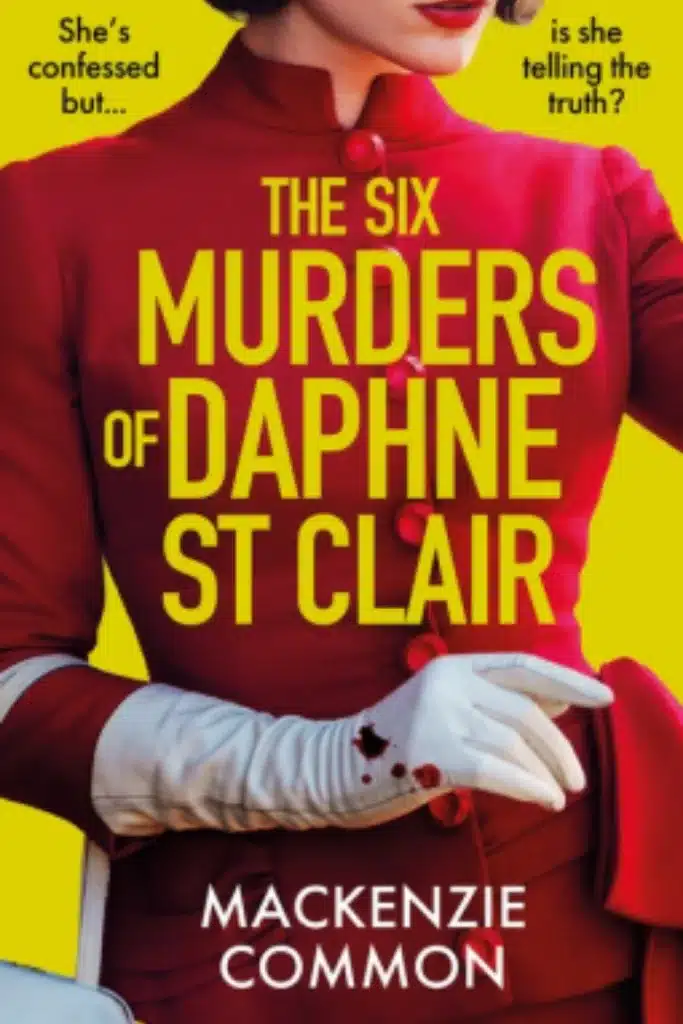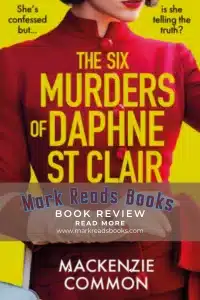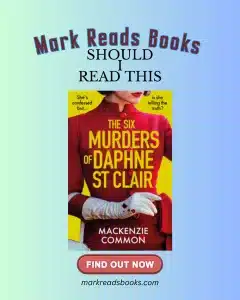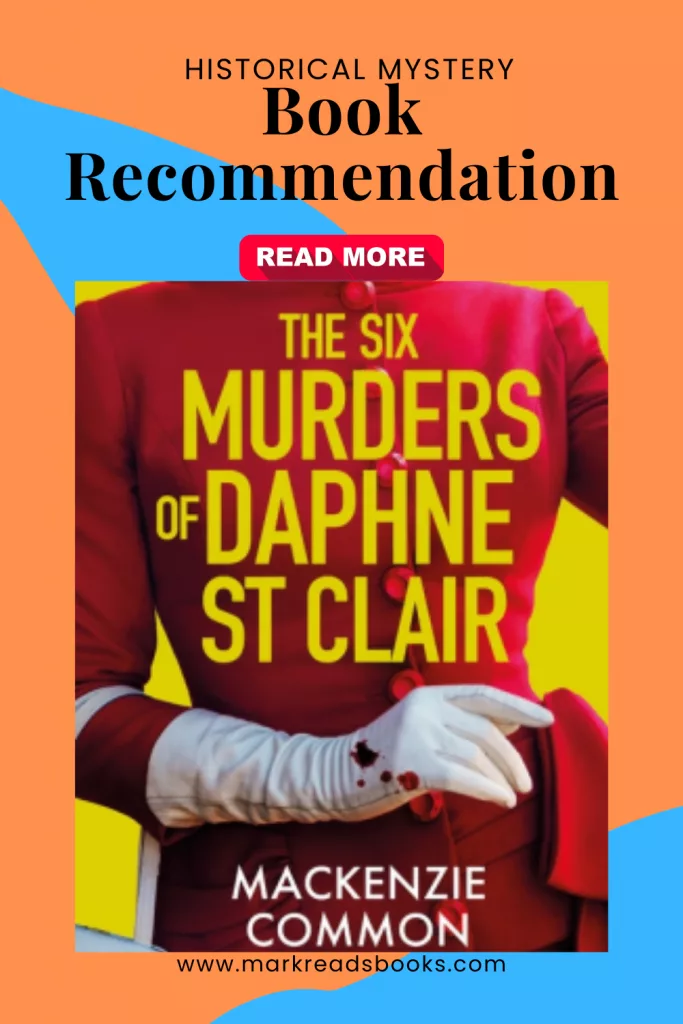Dark, provocative, and stylishly written, The Six Murders of Daphne St Clair by MacKenzie Common is a compelling critique of the true crime genre disguised as a gripping mystery.

by MacKenzie Common
Book cover
| Title | The Six Murders of Daphne St Clair |
| Writer | MacKenzie Common |
| Series | Standalone |
| Publisher | Headline, Mountain Leopard Press |
| Publication date | 19th June 2025 |
| MBR star rating /5 | ⭐⭐⭐ |
| Genre | Historical Fiction, Mystery Woman’s Fiction |
Fact sheet
I received an advance review copy for free, and I am leaving this review voluntarily.
FictionTags

Review Pinterest pin
Synopsis: The Six Murders of Daphne St Clair
When aging socialite Daphne St Clair confesses to six murders across decades, she chooses Ruth, an ambitious true crime podcaster, to shape her legacy. Each episode draws listeners deeper into Daphne’s world—from her Dust Bowl beginnings to her glamour-drenched, blood-soaked years in 1970s New York.
But storytelling is rarely neutral. As Daphne’s tale unfolds, Ruth becomes more than just a vessel for Daphne’s truth—she becomes part of the mystery. What starts as a sensational podcast project spirals into a tangled exploration of fame, power, and who controls the narrative.
The Six Murders of Daphne St Clair plays with form and perspective in clever, unsettling ways. Is Daphne a feminist icon avenging bad men, or a self-mythologizing killer manipulating the spotlight? And is Ruth documenting the truth—or editing it into something more palatable?

Review Instagram post
Review: The Six Murders of Daphne St Clair
MacKenzie Common’s The Six Murders of Daphne St Clair is a dark, genre-bending mystery that explores not just the psychology of a killer, but also the cultural obsession with true crime. Told through a gripping podcast-interview format, the novel dives into the murky waters of truth, manipulation, and the blurred lines between confession and performance.
At the center of the novel is Daphne St Clair, an elderly woman who claims to have killed six men throughout her lifetime. Her latest murder—committed just before the novel begins—is the final act that prompts her to reach out to an aspiring true crime podcaster named Ruth. What begins as a compelling confession quickly becomes something much more layered and unsettling.
The podcast framing is cleverly used, not as a gimmick, but as a narrative tool that reveals what isn’t said as much as what is. Readers are shown unedited transcripts that wouldn’t make the final podcast episodes, giving us a deeper, more intimate view of Daphne—and eventually Ruth.
Through this structure, it allows the novel to raise questions about who controls a story and what gets left on the cutting room floor. As the interviews progress, it becomes clear that Daphne may not be telling the whole truth—and Ruth, desperate to revive her faltering career, may not be asking the right questions for the right reasons.
In addition to the main interviews, the novel includes transcripts of online comment sections, and social media reactions to the podcast. These interjections serve a dual purpose: they add texture to the world, and they offer a sharp critique of the commodification of true crime.
In an age were murder can be monetized and victims turned into trending topics; this section forces readers to confront their own complicity as consumers, in the genre of true crime.
Characterization is another strength of the novel. Daphne is both chilling and charismatic, a woman shaped by trauma and secrecy, who remains frustratingly elusive even in her own supposed confession.
Ruth, on the other hand, is ambitious, flawed, and increasingly caught in a moral quagmire as she weighs truth against professional redemption. Both women are written with psychological depth, and much of the novel’s tension lies in the shifting power dynamic between them.
Themes of guilt, truth, legacy, and female rage underpin the narrative, and while the plot occasionally slips into ambiguity—particularly in the final chapters—the ambiguity seems deliberate. This is not a novel that ties everything up neatly. Instead, it leaves readers questioning what they believe, who they trust, and whether justice is ever really served.
Who Should Read It
The Six Murders of Daphne St Clair is ideal for readers who enjoy complex character studies wrapped in a mystery framework. Fans of books like The Nothing Man by Catherine Ryan Howard, True Crime Story by Joseph Knox, or My Favourite Murder–style podcasts will find much to appreciate here. It’s especially suited to readers who are interested in how true crime media affects public perception—and those who enjoy a morally grey protagonist (or two).
Conclusion
Dark, provocative, and stylishly written, The Six Murders of Daphne St Clair is a compelling critique of the true crime genre disguised as a gripping mystery. While its ambiguous ending may not satisfy every reader, it lingers in the mind long after the final page. For those willing to embrace uncertainty and dive into a morally tangled tale of murder and media, this novel is well worth the read.

Further reading
on Mark Reads Books
External Links
add to TBR

Like follow or share if you would want similar content.
Above all Keep Safe and treat people fairly.
Mark.